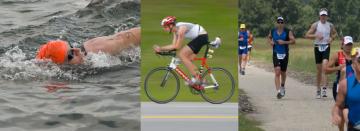Or search by topic
Number and algebra
Geometry and measure
Probability and statistics
Working mathematically
Advanced mathematics
For younger learners
Secondary Sport Collection
 Here is a nice collection of NRICH activities related to sport, ideal for the English sporty summer of 2012.
Here is a nice collection of NRICH activities related to sport, ideal for the English sporty summer of 2012.You can also find lots of lovely activities on the sport.maths.org pages.
Remember that our stages roughly refer to the English Key Stages in which the mathematical content is likely to be found and the number of stars indicate how difficult is is likely to be to get into the problem. All our problems are likely to contain enough depth to satisfy the most enthusiastic problem solvers!
Who's the Winner?



When two closely matched teams play each other, what is the most likely result?
Medal Muddle



Countries from across the world competed in a sports tournament. Can you devise an efficient strategy to work out the order in which they finished?
Olympic Records



Can you deduce which Olympic athletics events are represented by the graphs?
Olympic Measures



These Olympic quantities have been jumbled up! Can you put them back together again?
Speed-time Problems at the Olympics



Have you ever wondered what it would be like to race against Usain Bolt?
The Olympic Torch Tour



Imagine you had to plan the tour for the Olympic Torch. Is there an efficient way of choosing the shortest possible route?
Olympic Triathlon



Is it the fastest swimmer, the fastest runner or the fastest cyclist who wins the Olympic Triathlon?
The Fastest Cyclist



Andy is desperate to reach John o'Groats first. Can you devise a winning race plan?
Track Design



Where should runners start the 200m race so that they have all run the same distance by the finish?
Training Schedule



The heptathlon is an athletics competition consisting of 7 events. Can you make sense of the scoring system in order to advise a heptathlete on the best way to reach her target?
Nutrition and Cycling



Andy wants to cycle from Land's End to John o'Groats. Will he be able to eat enough to keep him going?
Olympic Logic



Can you use your powers of logic and deduction to work out the missing information in these sporty situations?
Who's the Best?



Which countries have the most naturally athletic populations?
Performing Beyond Expectations - Using Sport to Motivate Students in Mathematics Lessons
In this article, Alan Parr shares his experiences of the motivating effect sport can have on the learning of mathematics.
Little Little G



See how little g and your weight varies around the world. Did this variation help Bob Beamon to long-jumping succes in 1968?
Angle of Shot



At what angle should you release the shot to break Olympic records?
10 Olympic Starters



10 intriguing starters related to the mechanics of sport.
High Jumping
How high can a high jumper jump? How can a high jumper jump higher without jumping higher? Read on...
Stadium Sightline



How would you design the tiering of seats in a stadium so that all spectators have a good view?
What's the Point of Squash?



Under which circumstances would you choose to play to 10 points in a game of squash which is currently tied at 8-all?
Alternative Record Book



In which Olympic event does a human travel fastest? Decide which events to include in your Alternative Record Book.
Decathlon: the Art of Scoring Points
How do decisions about scoring affect who wins a combined event such as the decathlon?
You may also like
Decathlon: the Art of Scoring Points
How do decisions about scoring affect who wins a combined event such as the decathlon?

